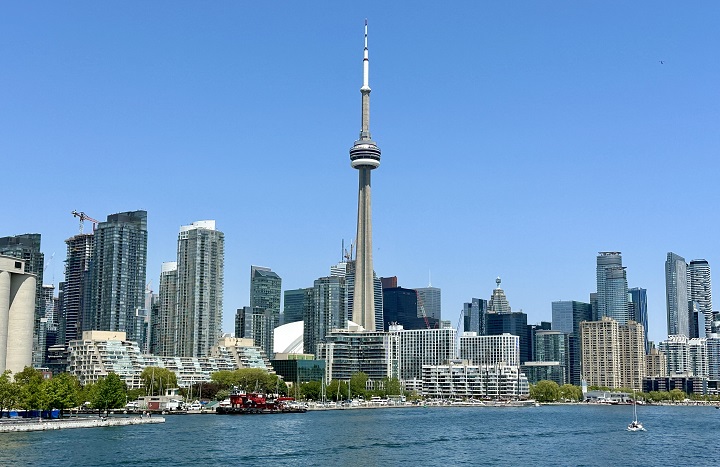Housing, income, food insecurity discussed at Mississauga mayoral debate

Posted May 16, 2024 5:32 pm.
Last Updated May 23, 2024 8:36 pm.
Two weeks before voters head to the polls, a mayoral debate featuring some of the top candidates for Mississauga mayor discussed topics such as insecurities in housing, income and food in Mississauga.
The debate, organized by Food Banks Mississauga, kicked off Thursday at 7 p.m. on CityNews 24/7 and was hosted by CityNews reporter Mark McAllister.
Dipika Damerla, Alvin Tedjo, Stephen Dasko and Brian Crombie all participated in the debate. Carolyn Parrish, currently the presumed frontrunner for the election based on recent polling, has said she will no longer be attending any debates.
Food Banks Mississauga says the debate will ensure that poverty alleviation along with housing and food security are key platform issues for all the candidates. Their participation criteria for candidates are those who have a platform on poverty alleviation and who have received a minimum of five per cent support as determined by polls conducted to date.
Candidates were primarily asked how they will meet people’s needs and keep people fed, with candidates agreeing Mississauga can build on food drives or not paying rent for food banks, as Damerla stated 30 per cent of people living in Mississauga struggle with food insecurity.
McAllister first asked Dasko how he plans to address the rising cost of living, to which Dasko said in his time as ward councillor, has gotten “300 affordable units that are being built right now, an additional 68 were just built, and more is needed… what we’re doing right now is not good enough.”
Tedjo stated that meeting housing targets is how the city of Mississauga can continue to grow, with more housing built meaning the lower taxes can stay.
Speaking about housing security, the second topic, Tedjo said 1 of 32 cranes in the sky in Mississauga is for a purpose built rental, everything else is market housing, saying, “we need supportive housing, we need affordable housing, we need more shelters.”
Damerla said she had a plan to fast track approvals to build houses in Mississauga, and would commit to provide city-owned land for free to build affordable housing, while Crombie said the only way he thinks things will get going is reducing the development fees the city takes as well as increasing the density of affordable housing around transit areas.
A specific question was asked to Damerla about homeless encampments and shelters at 400 per cent capacity, advocating for housing for vulnerable populations.
“I have been advocating with the federal government for more than a year, but Mississauga and the Region of Peel is happy to provide supports and set asylum seekers up for success, but we need the federal government at the table,” Damerla said. “We need them to fund us… we cannot continue to put these costs on the property tax base.”
The third topic discussed was income security, with 1 in 4 households who use food banks relying on Ontario Works as their primary income.
“If Ontario Works is so low that you have to rely on a food bank, you may as well increase Ontario Works, I think the provincial government understands that,” said Damerla.
Crombie raised the issue of public transit being least reliable in low income areas, saying the 20 per cent voter turnout “does not get the results for those most in need.”
To conclude the topics, candidates were asked how they can use their platforms to advocate for better funding.
“That’s the most important thing to getting something done, to reaching out on the ground and finding out what we need to get solutions,” said Dasko.
Closing out the debate, candidates were asked questions about what they are going to do to improve the lives of young people in Mississauga, and in what situations would they use strong mayoral powers.
“We have a real affordability crisis, we have a real housing crisis, we have people living on the street, we have people packing our shelters at 400 per cent capacity,” said Tedjo.
“If you need to use it, then use it. The one time that Mayor Crombie used it was for fourplexes… we had a tie vote, and she brought it back so we could vote on it, get $113 million from the federal government, and fast track more housing during this crisis.”
Those top four candidates spoke with CityNews last week to discuss why they believe residents of Mississauga should vote for them.
Damerla, Tedjo, and Dasko are close behind Parrish in the polls with 25 per cent of voters still undecided.
Parrish resigned her city council seat to run for mayor while the other three are still on Mississauga council.
The mayoral byelection to replace Bonnie Crombie, who has assumed the leadership of the Ontario Liberal Party, is set for Monday, June 10. The election to replace the vacancy in Ward 5, a seat left open by Parrish, will be held on the same date.








